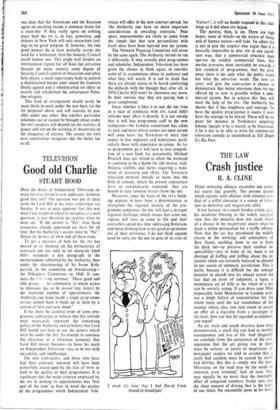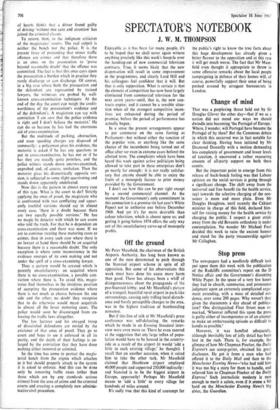Crash justice
THE LAW R. A. CLINE
Minor motoring offences encumber our crimi- nal courts like greenfly. The present system which equates such offences with criminal con- duct of a wilful character is a source of irrita- tion to motorists and magistrates alike.
A law lecturer, in a recent Sunday article, gave his academic blessing to the widely accepted view that the motorist does not stand much of a chance in the magistrates' courts when he faces a police prosecution for a traffic offence. Now that the car has introduced the middle classes to the workings and atmosphere of Bow Street, enabling them to see it from the dock (or—to preserve their residual re- spectability—just in front of it), there is no shortage of huffing and puffing about the in- justices which are currently believed to abound in our courts of summary jurisdiction. This is partly because it is difficult for the average motorist to absorb into his ethical system the fact that an error of judgment, a lapse, a momentary act of folly at the wheel of a car can be morally wrong. If you drive your Mini impeccably from Manchester to London with- out a single failure of concentration for the whole route until the last roundabout of the journey where, alas, you turn round to accept an offer of a cigarette from a passenger at the back, how can that be regarded as criminal, you argue?
As air, train and coach disasters have long demonstrated, a small slip can lead to terrible consequences and loss of life. And illogically we conclude from the seriousness of the con- sequences that the act giving rise to them must be serious; as jurors or magistrates or newspaper readers we tend to assume that a really bad accident must be caused by really bad driving. But this is simply not the case. Massacres on the road may be the result of immoral, even 'criminal,' lack of care; they may equally be no more than the inevitable effect of congested numbers, frailer cars and the sheer amount of driving that is the habit of our times. No reasonable juror in his heart
of hearts thinks that a driver found guilty of driving 'without due care and attention' has joined the criminal classes.
To return, then, to the indignant criticism of the magistrates' courts. The real culprit is neither the bench nor the police. It is ..the present farce of pretending that minor eraffic offences are crimes and that therefore there is an onus on the prosecution to `prove beyond reasonable doubt' that the offence was committed. The fact is that this onus casts upon the prosecution a burden which in practice they rarely discharge or can discharge. Of course, in a big case where both the prosecution and the defendant are represented by trained lawyers, the witnesses are probed by well- known cross-examination techniques. At the end of the day the court can weigh the credit- worthiness of the prosecution's evidence and of the defendant's. A magistrate can say with conviction 'I am sure that the police evidence is right and I don't believe the motorist.' He can do so because he has had the enormous aid of cross-examination.
But the multitude of parking, obstruction, and even speeding charges are disposed of summarily : a policeman gives his evidence, the motorist is asked if he has any questions to put in cross-examination, he has not or if he has they are usually quite pointless, and the police witness stands down uncross-examined, unprobed and, of course, unshaken. Then the motorist gives his diametrically opposite ver- sion, is subjected to some slight questioning and stands down apparently undefeated.
Now this is the pattern in almost every case of this type. What is the court to do? Strictly applying the onus of proof, the magistrate who is confronted with two conflicting and appar- ently truthful versions should say in almost every case, 'there is a doubt because there are two equally possible versions.' He has no magic lie detector with which he can assess who told the truth. For that he is dependent on cross-examination and there was none. If we are to continue treating these motoring cases as crimes, then in every such case where there is no lawyer at hand there should be an acquittal because there is a reasonable doubt. The only exception is where some inconsistency in the evidence emerges of its own making and not under the spell of a cross-examining lawyer.
Thus a pattern would be created which is patently unsatisfactory : an acquittal where there is no cross-examination, a possible con- viction where there is. To avoid this, magis- trates find themselves in the invidious position of accepting the prosecution evidence where there is not much to choose between the one side and the other; no doubt they recognise that to do otherwise would mean acquittals in almost all the lesser motoring cases. The police would soon be discouraged from en- forcing the traffic laws altogether.
The law lecturer and his enraged troop of dissatisfied defendants are misled by the existence of that onus of proof. They go to court and hope to see it enforced in all its purity, and the depth of their feelings is en- larged by the conviction that they have done nothing either immoral or criminal.
So the time has come to protect the magis- terial bench from the stigma which attaches to it but should properly attach to the system it is asked to enforce. And this can be done only be removing traffic cases (other than those which are by any standards serious crimes) from the area of crime and the criminal courts and creating a completely new adminis- trative-civil proced are.



































 Previous page
Previous page